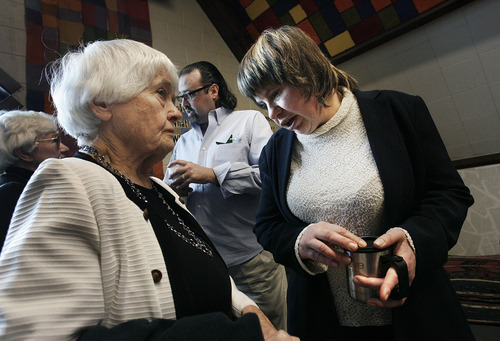This is an archived article that was published on sltrib.com in 2011, and information in the article may be outdated. It is provided only for personal research purposes and may not be reprinted.
When a church member asks Lisa Larges on Sunday why she doesn't just leave the Presbyterian Church (U.S.A.) — which has refused for more than 20 years to ordain her as a minister because she is a lesbian — she answers with typical humor and sincerity.
For one, she quips that she doesn't want to leave the church "as long as there are people who want me to go." Secondly, she jokes that: "It's like waiting for a bus. You sit there and sit there, and as soon as you walk away, the bus is going to pull up."
But lastly, she says, simply: "I feel called to be in the Presbyterian Church, and I feel called to be doing this, which is pursuing the issue."
Larges, who leads a New York-based group called That All May Freely Serve, visited Wasatch Presbyterian Church on Sunday to talk about a change to the church's constitution that would allow lesbian, gay, bisexual and transgender (LGBT) candidates to be ordained as elders, deacons and ministers.
The church's General Assembly approved the change last year, and now a majority of the church's 173 regional presbyteries must approve it this year for it to go into effect.
The last time the issue came before the presbyteries in 2009, the Utah Presbytery voted to approve the change, but only narrowly, Larges said. Nationwide, the change failed to pass.
Now Larges travels around the country trying to educate congregations about the issue and advocating for the change. Though the church does not bar LGBT people from membership, it does require those seeking to be ordained as officers of the church "to live either in fidelity within the covenant of marriage between a man and a woman, or chastity in singleness." It also says that, "Persons refusing to repent of any self-acknowledged practice which the confessions call sin shall not be ordained and/or installed as deacons, elders or ministers of the Word and Sacrament."
Larges, however, says the church should change its position both to be more inclusive and to be more in line with its own teachings about sin and the authority of Jesus Christ. She said Sunday the church needs to "get back to the fundamentals of our faith."
"It needs to happen, and the reason it needs to happen is the next generation is not coming to church, and they're not coming to church because we're hypocrites," Larges told a class of congregants gathered at Wasatch Presbyterian on Sunday. "They don't want to be part of a church that claims to love Christ and actively discriminates."
A number of congregation members said Sunday they agreed with Larges' message and hope to see members of the Utah Presbytery vote to approve the change this year.
"I think they should be welcome," said Jackie Solon, a member of the Wasatch Presbyterian congregation. "We're not the ones who make a decision about who's called [to serve]. God calls people."
Ashtora, a deacon at the church who said she goes by only one name, said: "There's nothing to be afraid of. We're just all God's children."
Ashtora said she invited Larges to speak to the class to further the conversation about the issue. She said not everyone in the congregation agrees that LGBT people should be allowed to be ordained, but they have tried not to let it divide them.
Congregation member Don Drew, for example, said he's on the fence about the issue, but at the same time he doesn't believe a person's sexual orientation "is going to change their love of Christ."
"It's been difficult for me," Drew, a church elder, said. "I'm from a very ultra-conservative family, but I'm also beginning to learn that love really doesn't see any distinction between us."
Larges said the people at churches such as Wasatch Presbyterian keep her going in her quest to gain ordination for herself and other LGBT people.
"There's just so much beauty in our church, such as in places like this," said Larges, who is blind. "I want that to be the norm."



